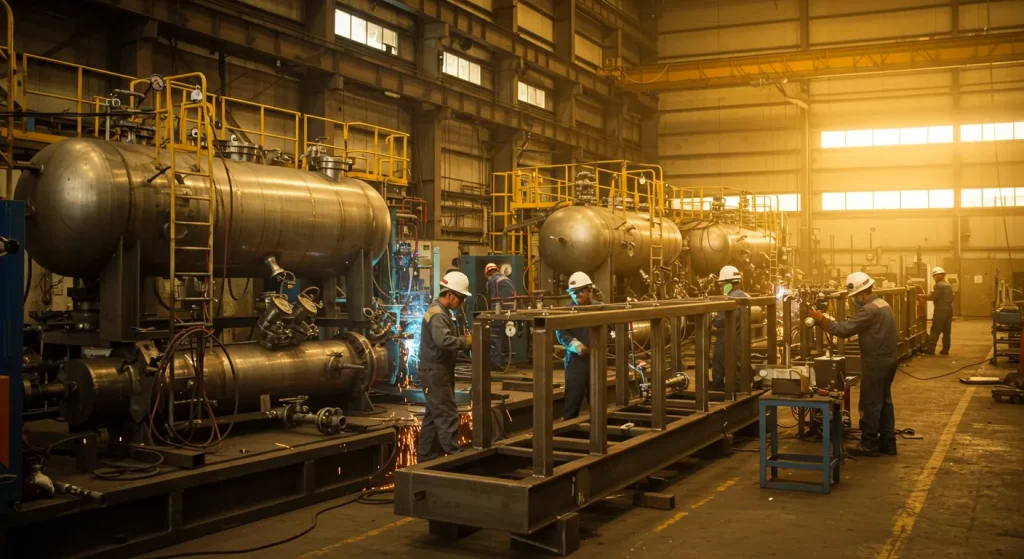
## Engineering, Procurement, and Construction (EPC): The Key to Turnkey Oil and Gas Projects
The oil and gas industry demands complex, capital-intensive projects that require meticulous planning, efficient execution, and adherence to stringent safety standards. Enter Engineering, Procurement, and Construction (EPC), a project delivery method that has become the cornerstone for developing and commissioning these intricate facilities. EPC projects offer a “turnkey” solution, providing a single point of responsibility for the entire lifecycle, from initial design to operational readiness.
**Understanding the EPC Model**
In an EPC project, a single contractor, the EPC Contractor, takes on the responsibility for:
* **Engineering:** This phase involves detailed design, front-end engineering design (FEED), process engineering, civil engineering, and all other engineering disciplines necessary to create a complete and functional facility.
* **Procurement:** The EPC Contractor is responsible for sourcing, purchasing, and delivering all equipment, materials, and services required for the project. This includes everything from specialized machinery and pipelines to construction materials and software.
* **Construction:** The final phase involves the physical construction, installation, testing, and commissioning of the facility. This includes site preparation, foundation work, equipment installation, piping, electrical work, instrumentation, and control systems.
The beauty of the EPC model lies in its simplicity for the client, often referred to as the “owner.” The owner outlines their requirements and specifications, and the EPC Contractor delivers a fully functional facility, ready for operation.
**Benefits of the EPC Approach**
The EPC model offers numerous advantages for oil and gas projects:
* **Single Point of Responsibility:** The owner deals with a single entity accountable for the entire project, streamlining communication and reducing the potential for disputes between multiple contractors.
* **Risk Mitigation:** The EPC Contractor assumes significant responsibility for project execution, including schedule, cost, and performance. This transfers a significant portion of the project risk away from the owner.
* **Cost Certainty:** EPC contracts often involve a lump-sum price, providing the owner with a clear understanding of the total project cost from the outset.
* **Faster Project Delivery:** The integrated nature of the EPC model allows for concurrent engineering, procurement, and construction activities, accelerating the overall project timeline.
* **Technical Expertise:** EPC Contractors typically possess extensive experience and specialized expertise in oil and gas projects, ensuring the project is executed to the highest standards.
* **Predictable Performance:** EPC contracts often include performance guarantees, ensuring the facility meets specific operational targets after commissioning.
**Challenges of EPC Projects**
While the EPC model offers significant benefits, it’s crucial to acknowledge the potential challenges:
* **High Upfront Costs:** EPC projects require significant upfront investment, as the EPC Contractor needs to secure resources and manage risk.
* **Potential for Change Orders:** Unforeseen circumstances or changes in project scope can lead to costly change orders, increasing the overall project cost.
* **Contractor Selection is Critical:** The success of an EPC project hinges on selecting a competent and experienced EPC Contractor with a proven track record.
* **Effective Communication is Essential:** Clear and consistent communication between the owner and the EPC Contractor is vital to ensure the project remains on track and meets the owner’s expectations.
* **Complexity of the Contract:** EPC contracts are complex legal documents that require careful negotiation and understanding by both parties.
**Key Considerations for Successful EPC Project Execution**
To maximize the benefits of the EPC model, owners should consider the following:
* **Thorough Front-End Loading (FEL):** Investing in detailed FEED studies is crucial to minimize risks and potential changes during the execution phase.
* **Rigorous Contractor Selection:** Conduct a thorough due diligence process to evaluate potential EPC Contractors based on their experience, financial stability, and technical capabilities.
* **Well-Defined Project Scope:** Clearly define the project scope and objectives to minimize ambiguity and potential disputes.
* **Strong Project Management Team:** Establish a dedicated project management team to oversee the EPC Contractor’s performance and ensure the project aligns with the owner’s goals.
* **Effective Communication and Collaboration:** Foster a collaborative relationship with the EPC Contractor, emphasizing open communication and proactive problem-solving.
**The Future of EPC in Oil and Gas**
The EPC model will continue to be a dominant force in the oil and gas industry, particularly for large-scale projects. As the industry evolves, we can expect to see:
* **Increased use of digital technologies:** Digital twins, virtual reality, and artificial intelligence will play a greater role in project planning, execution, and optimization.
* **Focus on sustainability:** EPC projects will increasingly incorporate sustainable design principles and technologies to minimize environmental impact.
* **Greater collaboration and integration:** EPC Contractors will need to work more closely with owners and other stakeholders to optimize project outcomes.
**Conclusion**
EPC projects offer a proven and effective approach to developing and commissioning complex oil and gas facilities. By understanding the benefits, challenges, and key considerations of the EPC model, owners can mitigate risks, ensure project success, and ultimately deliver valuable assets that contribute to the global energy landscape. Selecting the right EPC contractor and focusing on collaboration and communication are vital for ensuring a successful outcome.